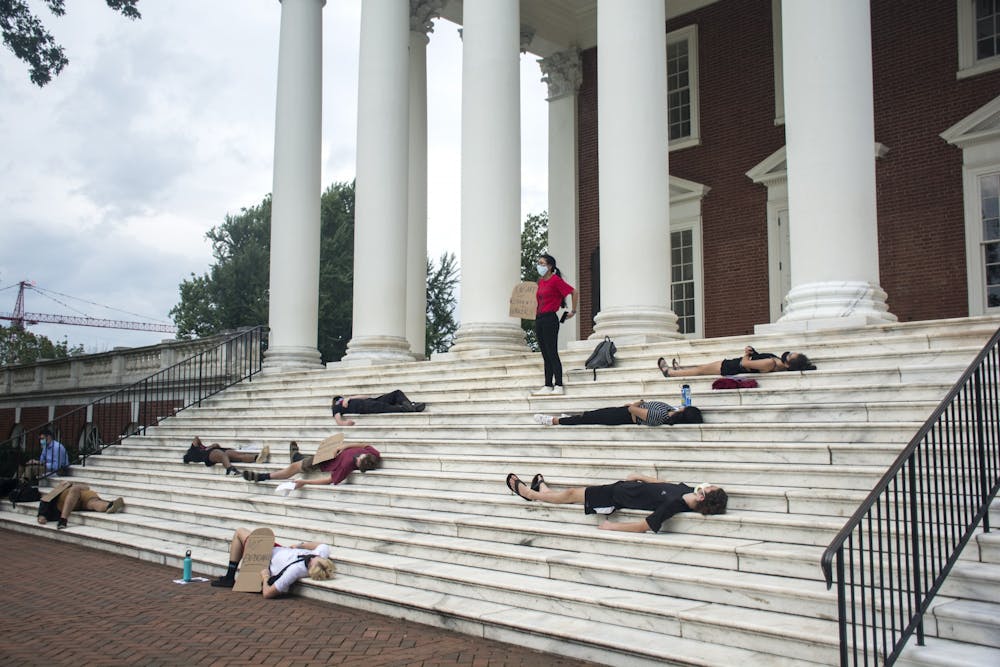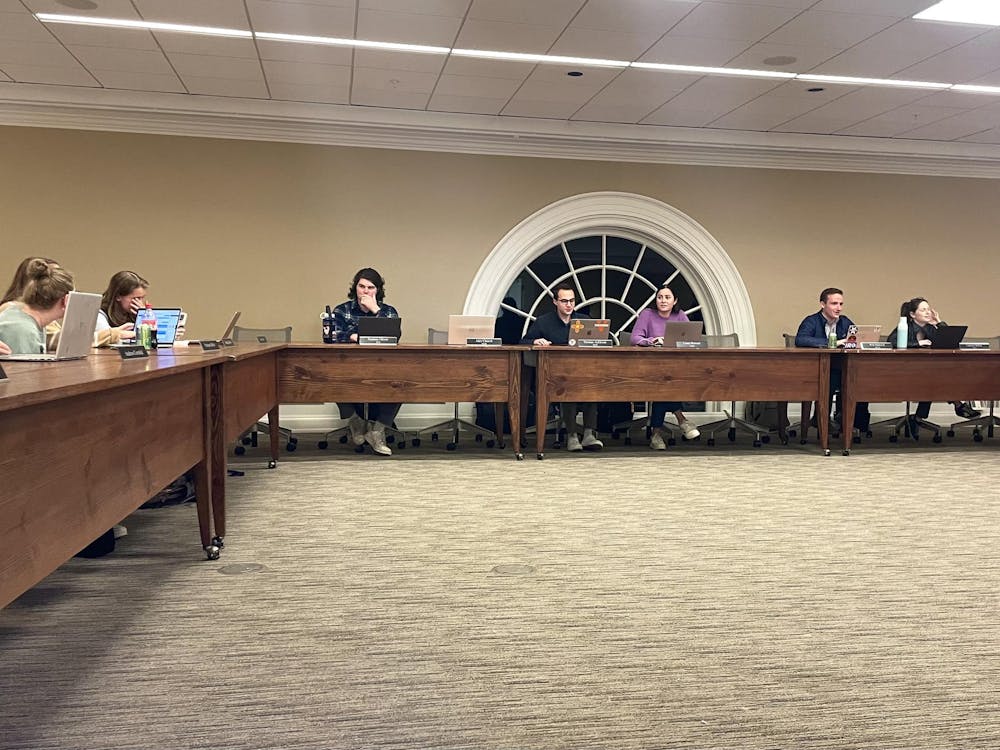A “Die-In” demonstration held by U.Va. Young Democratic Socialists of America, Charlottesville Democratic Socialists of America and the United Campus Workers of Virginia at U.Va. attracted approximately 50 protesters to symbolically pretend to lie dead on the Lawn on Wednesday afternoon in protest of the University’s reopening plans.
The purpose of the demonstration was to express to the University that no lives should be expendable in the choice to move forward with on-Grounds instruction, which is set to begin Tuesday. Demonstrators chanted the slogan that titled the YDSA’s demands — “no acceptable losses, no in-person classes.”
“I am hoping the admin realizes our lives, students, workers and community members are at risk,” said Sarandon Elliott, a third-year College student and chair of U.Va. YDSA. “U.Va. admin are gambling with our lives and wellbeing, and it's a bad bet. We have seen so many campuses shut down and people get sick because Universities wanted to take chances. I want U.Va. to care about us and do the right thing.”
The University’s chapter of YDSA organized the event to occur shortly after the release of their demands for administration to pursue actions such as a reversal of the decision to convene in-person classes this semester, a reversal of tuition increases for the 2020-21 school year, a firing freeze and hazard pay for all employees required to work in-person.
The demands were endorsed by the three host organizations, as well as the University Democrats and the University’s Organization of Young Filipino Americans.
Similarly, the UCWVA also recently released their #ActFASTUVA campaign asking the University to abandon in-person learning and cancel move-in for undergraduate students.
Before lying silently still for the 15-minute “die-in,” participants sat in a large, socially-distanced circle on the Lawn to write letters that demonstration organizers plan to give to University administration.
“I don’t want to see any of my graduate student instructors be compelled to give in-person instruction when they have personally lost family members to COVID, and when they’ve personally experienced great hardship due to the pandemic,” said one third-year undergraduate student who participated. “The [University] administration’s decisions are not reflective of the best interests of students, workers and the Charlottesville community.”
The letters will be a part of a letter-drop campaign YDSA is organizing, according to André Zazzera, a member of UCW of Virginia and a graduate student in the School of Data Science.
“The letters that participants wrote to University admin were a way for us to be able to authentically represent the voices of our community,” Zazzera said.
Lillie McVey, co-chair of Charlottesville DSA, believes the main concern with resuming in-person classes is the impact that the spread of COVID-19 will have on the Charlottesville community at large. She emphasized the importance of students limiting their exposure to the community to protect the people of Charlottesville.
McVey anticipates that allowing students to come back will lead to an instant spike in cases that will harm workers. While University students are also at risk, she noted that many community members that will be put in danger may not have the same resources or safety nets as professors or students.
“This city is full of workers who do not have healthcare or have poor healthcare, who have complex medical issues that have been untreated for years,” McVey said.
McVey noted that she thinks the University does not have Charlottesville’s best interest in mind, especially when many community members are in positions where they cannot limit their exposure.
During an online meeting, the Charlottesville Human Rights Commission declared its intent to send a letter to University President Jim Ryan urging him to not bring undergraduate students back to Grounds. In July, Charlottesville Mayor Nikuyah Walker called the University’s plan to reopen “a recipe for disaster.”
“The University always likes to say that they are at the heart of this community but just continues to make policies that hurt everybody in this town,” McVey said. “And, frankly, the community members are sick of being bled dry by this university.”
Zazzera also expressed that students should follow appropriate safety guidelines and hopes that members of the University community act with respect. However, the organizers argue that the University will be at fault when cases begin to rise drastically, workers are laid off and students are left in precarity when the University goes back to online classes.
After the 15 minutes of demonstration across the grass and on the steps of the Rotunda, several representatives from the host organizations spoke to the crowd.
Elliott talked about the University’s fault in the potential outcomes of the spread of COVID-19, pointing to student housing circumstances as one of the issues the University is facing. The lack of affordable on-Grounds housing has forced students who have been locked into off-Grounds leases since the winter to return to Charlottesville, she said.
Elliott also acknowledged that the pandemic disproportionately affects Black people across the country, a point that McVey reiterated.
A report by the Center for Disease Control showed that the percentage of Black coronavirus patients was higher than the percentage of Black people that make up the population. Doctors at the University hospital were among the first to notice this trend, according to UVAToday.
“Across the United States, COVID is impacting communities of color the hardest, and that’s definitely going to be the case in Charlottesville as well,” McVey said. “Given the disregard for people of color that runs through the University’s history, it’s not surprising to see their indifference about this decision.”
Elliott and the YDSA additionally called for the opportunity for students to choose credit/no credit as a grading option if the University is going to put them at risk. The UCW union discussed the importance of providing proper personal protective equipment for the University’s Resident Advisors and facilities management workers, including extra hand sanitizer and masks.
Zazzera and Elliott both were impressed with the turnout for the “Die-In.” The organizers felt they had an appropriately-sized group of people to get the message across without putting any participants in danger, as everyone was able to properly social distance on the Lawn.
Ultimately, Zazzera wants the University to acknowledge the efforts the community is willing to put forth to change administrative decisions. The demonstrators are committed to fighting for safety and standing in solidarity with those put at risk by the administration’s plans to reopen.
“Whether they be students, workers or Charlottesville residents, UCWVA is not going to stop being present and demanding justice until we get it,” Zazzera said.
Elliott wrote in an email to The Cavalier Daily that she hopes students continue to fight and organize for what they believe in.
“I do want students to remember how U.Va. has treated us during this time,” Elliott said.
Die-In held on U.Va. Lawn to protest on-Grounds instruction (Photos by Emma Klein | The Cavalier Daily)





